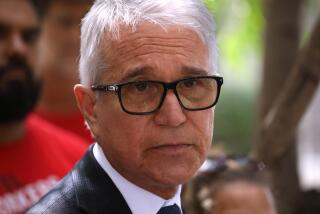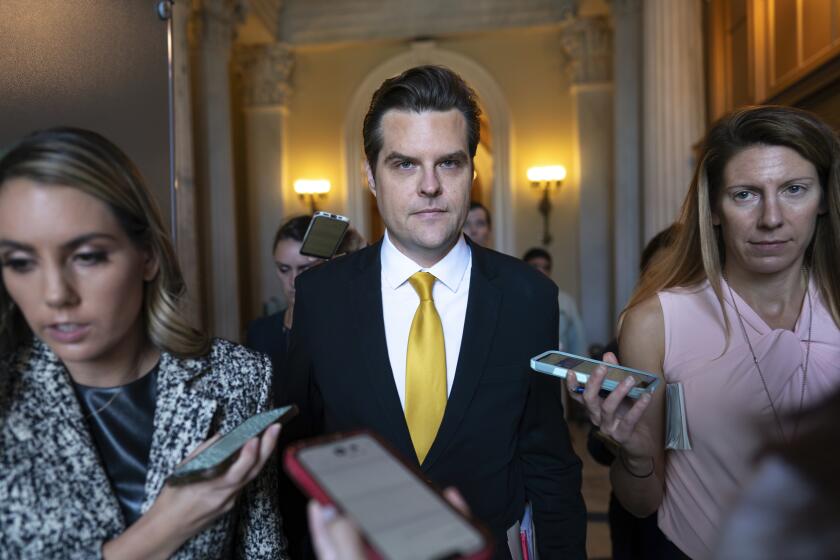L.A.âs mayoral race just got more complicated
With the first round of the Los Angeles mayoral election still more than four months away, the race has taken shape in recent weeks, largely because of two developments that have scrambled the handicapping of the contest.
First, it became clear that the front-runners would all be current city office-holders. For months, it had seemed likely that at least one of three strong outside candidates would be in the race, but now they have all decided not to run. Austin Beutner, a wealthy businessman whose only city service was a brief stint as special deputy to Mayor Antonio Villaraigosa, started to build a campaign and make appearances, then reconsidered and dropped out in May. Next, in August, county Supervisor Zev Yaroslavsky, one of the areaâs best-known public officials, opted out after toying with the idea of running for months. And then, Rick Caruso, a wealthy developer best known for the Grove and Americana at Brand, surprised some of those closest to him by announcing recently that he wouldnât run â after months of insisting that he was considering it.
The three men all passed for different reasons, but their decisions to remain on the sidelines deprive the campaign of a significant counterweight to the political clout of unions. All three were credible candidates, able to raise or contribute the money needed wage a serious campaign, and each of them is independent of the regionâs labor movement. Yaroslavsky has long been regarded with some wariness by labor, and both Beutner and Caruso come from business, not unions.
Their departure from the campaign leaves the race dominated by three City Hall incumbents, each of them beholden in some way to labor, though thatâs least true of City Councilwoman Jan Perry. Councilman Eric Garcetti and City Controller Wendy Greuel both have long and close allegiances to the labor movement, and each has received ample financial and political support from unions and union members.
Had any one of the three departed candidates stuck it out, there would have been a credible candidate with an outside message and the means to bring it to the electorate. Without them, the only significant voice from outside the liberal-labor alliance that holds such sway at City Hall belongs to Kevin James, a lawyer and radio personality who recently picked up the endorsement of Los Angeles Dist. Atty. Steve Cooley. James is Republican and openly gay â not a combination you see every day in Los Angeles politics â and heâs the clearest beneficiary of the elimination of Beutner and Caruso. Heâs a plucky campaigner and a personable guy, but he still trails well behind the City Hall candidates in name recognition and money, and also in the polls.
In a sense, then, this is a dream race for labor, whose chosen candidates top the field. âGiven the fact that Rick and Austin didnât run ⌠things like grass roots, phone calling and door knocking will become more important,â said Bill Carrick, the political consultant who is heading Garcettiâs effort. And those , of course, are the things labor does best.
Moreover, laborâs power is heightened in low-turnout elections â its members are reliable voters â and recent campaigns for mayor have drawn shockingly low turnout. As one political consultant unaffiliated with any candidate in this race reminded me last week, it only takes about 110,000 to 120,000 votes to make the runoff â in a city of more than 3 million people.
But that brings us to the second development, and itâs of a very different type. The political context of the election is being stirred by a former occupant of the office. Former Mayor Richard Riordan announced recently that he will work to qualify a ballot measure to overhaul the cityâs pension system. The initiative, which would appear on the May ballot at the same time as the runoff in the mayoral contest, would eliminate pensions for future city employees, substituting a 401(k) plan and capping increases in benefits when the system is underfunded.
That measure poses such a direct threat to public employees that the city unions may be forced to direct their energies and money toward defeating it rather than campaigning for mayor.
Carrick doesnât think so, and he argues that Riordanâs effort, which is modeled in part on successful pension reform measures this year in San Jose and San Diego, may find voters here skeptical. Still, public employees are not at the height of their popularity, and Riordan brings his name, his money and the political coalition he built as mayor. He is not to be taken lightly.
Lastly, there is an overriding question about just how effective labor can be in a mayorâs race. Unions fought against Riordan and lost. They split when James Hahn and Villaraigosa ran against each other the first time. In the second race, they backed Hahn and lost again. So the recent track record is mixed at best.
This will be a complicated political season for labor. The events of recent weeks have made it all the more so.
Jim Newtonâs column appears Mondays. His latest book is âEisenhower: The White House Years.â Reach him at [email protected] or follow him on Twitter: @newton_jim.
More to Read
A cure for the common opinion
Get thought-provoking perspectives with our weekly newsletter.
You may occasionally receive promotional content from the Los Angeles Times.











